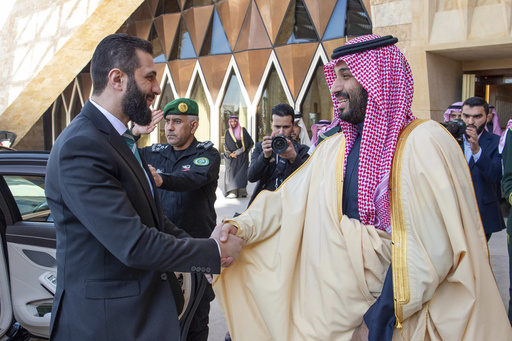DUBAI, United Arab Emirates — In a significant diplomatic move, the interim president of Syria embarked on his inaugural international journey to Saudi Arabia on Sunday, signaling a potential pivot from Iran, long regarded as Damascus’ primary regional ally.
Ahmad al-Sharaa, recognized previously by his alias Abu Mohammed al-Golani and previously linked to al-Qaida, arrived in Riyadh alongside Asaad al-Shaibani, the foreign minister of his government. They were welcomed aboard a Saudi jet, which proudly displayed the Saudi flag.
Saudi state media emphasized the importance of al-Sharaa choosing Riyadh as his initial destination for foreign engagement. Once at the airport, Syria’s newly adopted tri-colored flag was prominently displayed alongside that of Saudi Arabia. Al-Sharaa donned a suit and tie as he disembarked and proceeded to meet Crown Prince Mohammed bin Salman, the de facto ruler of Saudi Arabia, at al-Yamamah Palace in the capital city.
The discussions between al-Sharaa and the Crown Prince were framed by the Saudi Press Agency as efforts to enhance the security and stability of “sisterly Syria.” Al-Sharaa later remarked to Syria’s state-run SANA news agency that they focused on enhancing collaboration in various domains, especially humanitarian and economic matters.
Historically, Saudi Arabia has invested significantly in groups opposing President Bashar Assad, especially following the violent escalation of protests in Syria that began in 2011. However, these insurgent factions faced setbacks in the face of Assad’s support from Iran and Russia, leading to a stalemate in the conflict.
The dynamics shifted with a surprising December military advance led by al-Sharaa’s Hayat Tahrir al-Sham, which had earlier been associated with al-Qaida but has since cut ties with the group. Al-Sharaa has been strategically promoting a modernized image for his governance, often donning an olive-colored military outfit and appointing women to key positions while simultaneously fostering connections with Syria’s Christian and Shiite Alawite communities.
Additionally, al-Sharaa’s government has attempted to keep both Iran and Russia at a distance. Iran has not reopened its embassy in Damascus, a key operational center in its regional strategies alongside Assad’s regime and Hezbollah in Lebanon. Iranian media referred to al-Sharaa’s trip to Saudi Arabia, in the backdrop of a recent détente between Tehran and Riyadh, yet did not delve into Iran’s challenges within Syria.
Russia, while keen on retaining access to its military bases in Syria, transitioned to supporting Assad after he fled during military advances. These diplomatic gestures seem directed at alleviating Western sanctions imposed on Syria, with reconstruction estimated to cost hundreds of billions, and a pressing need to address the impoverished state of many Syrian citizens.
Earlier in the year, Saudi Foreign Minister Prince Faisal bin Farhan journeyed to Damascus and mentioned that Riyadh has been proactively engaging in dialogue aimed at lifting sanctions on Syria. Contrary to al-Sharaa’s key allies in Turkey and Qatar, Saudi Arabia reestablished relations with Assad in 2023, a rallying point for broader Arab world support that could play a crucial role in their partnership moving forward.
Before his visit to Saudi Arabia, al-Sharaa met with Qatar’s ruling emir, Sheikh Tamim bin Hamad Al Thani, signifying the importance of international recognition for his administration.
Nonetheless, challenges persist for Syria’s interim government, particularly from the Islamic State and other militant groups. A recent incident in the Aleppo governorate, where a car bomb detonated in the city of Manbij, resulted in four civilian fatalities and nine injuries, amplifying the continuing security dilemmas faced by the government. Turkish-backed Syrian rebels had taken control of Manbij in December as part of Turkey’s efforts to establish a buffer zone along its border.
